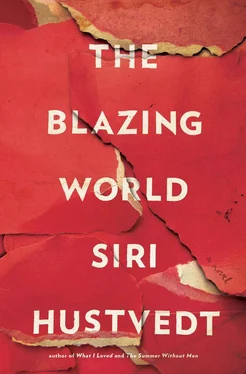It should not be forgotten that Harry had been rewriting her own life in psychoanalysis for years, that what she called a slowly developing “revisionist text” of her life had begun to replace an earlier “mythical” one. People and events had taken on new significance for her. Her memories had changed. Harry had not recovered any dubious memories from her childhood, but on February 19, 2003, only a month before Beneath was shown, she told me that when she looked back on her life, vast stretches of it had vanished. With a little prompting, she could easily fill in those blanks with fictions. Weren’t most memories a form of fiction anyway? She remembered what I had forgotten, and I remembered what she had forgotten, and when we remembered the same story, didn’t we remember it differently? But neither of us was prevaricating. The scenes of the past were continually being shifted and reshuffled and seen again from the vantage point of the present, that’s all, and the changes take place without our awareness. Harry had reinterpreted any number of memories. Her whole life looked different.
And, Harry asked, where does it begin? The thoughts, words, joys, and fears of other people enter us and become ours. They live in us from the start. Moral panic, the multiple-personality epidemic, and recovered-memory mania ran wild in the eighties and early nineties as a wave of suggestion passed from one person to another, a kind of mass hypnosis or spreading unconscious permission that allowed countless people to suddenly become many, a Pandora’s box. Therapists reported on patients with dozens of personalities. Whole populations housed inside a single body — men, women, and children coming out as alters. What did it mean? And then when the name of the illness was changed to Dissociated Identity Disorder and skepticism reasserted itself, the numbers of people diagnosed with the illness diminished to a few cases here and there. What Harry wanted to know was: Were we just one person or were we all many? Didn’t actors and authors invent characters for a living? Where did those people come from?
I argued that however passionate artists were, they knew the difference between creator and creation, that the illness, under whatever name, was connected to trauma and that, without question, the epidemic had been encouraged by eager and often ill-informed therapists.
Harry sat across from me, her gray hair curling out from under her beret, waving at me with her right hand, with which she knocked over her teacup and sent the pale brown liquid seeping across the tablecloth. Yes, yes, she said, but aren’t creatures and alters manufactured from the same subliminal material? Aren’t these others inside us like dream figures? She shooed away our solicitous waiter who had come running, placed her napkin over the stain, and continued. She had been working with Rune for some time, and for Beneath the two of them had been playing games and staging them on film, games with masks, costumes, and props. And when they played, things began to happen. Harry held me with her eyes. I asked her, What things?
What excited and sometimes frightened her, she said, was what Rune brought out in her, and whatever it was, she believed it had been in her for a long time but had never been let out. I recorded her words in my journal the same evening, or at least her words as I remembered them. The whole project is almost over now, Rachel. Soon the trilogy of my personas will be finished . She stressed that Rune had been embedded in Beneath as a “personified possibility.” She had borrowed the words from Kierkegaard. It was the idea of Rune she wanted to exploit, far more than Rune himself, but the idea of him had given her mobility, had opened doors inside herself. Harry’s voice grew louder, and I noticed that a man and a woman at the table next to us had stopped talking and turned to glare at us. I put my finger to my lips to indicate that she should lower her voice, and Harry’s mood turned dark. That’s what I mean , she hissed at me. Don’t be loud, Harry. Don’t make waves, Harry. Keep your knees together, Harry. It’s not polite, Harry .
Irritated, I said to her, Good grief, what have I done? I noticed you were talking too loudly to keep our conversation private, and I sent you a discreet signal. Harry leaned toward me and growled in my direction. That’s what I’m trying to tell you. The thing, the person — whatever it is — is ruthless, cocky, loud, cold, superior, cruel, dismissive, and untouchable. The thing is not polite. It has never been polite .
Sounds like a real charmer, I said to Harry. I was smiling, but Harry did not find my characterization funny. She looked at me gravely. I suggested that different personalities bring out various aspects of our own, and I explained that I often feel loud with soft-spoken people or retiring and shy with someone who bellows at me. It all depends on the interaction. Harry insisted that she was talking about something far more dramatic. She had never been able to resist what she called “the pull of the other.” As a child she had always obeyed the rules. She had rarely been punished, because she couldn’t bear the idea of disappointing her parents. Neither one of them had been strict or severe, but for some reason, she had always felt wrong, not right. I worked so hard to turn myself into the right kind of child, but I never succeeded. It pained me to listen to her, but I knew I was hearing her revised story.
Harry leaned forward, both hands in front of her over the soggy napkin. I covered her right hand with my own and felt grateful that we had been seated in a corner and that she was now speaking in a voice so soft I had to lean close to her to hear what she was saying. She wanted to know if I remembered the grand plans we had had for our futures. We were both going to be famous women, remember? I remembered. Harry smiled at me. We raised our consciousnesses. Do you remember? I remembered. It didn’t do any good, Harry said. What I raised turned out to be false consciousness. She had become an artist, all right, but no one can be an artist when her work always comes second to everyone and everything else. She had never been first in anything. Ever. Harry pulled her hand away from under mine and looked at me with tears in her eyes.
I pointed out to Harry that she had actually been first in our Hunter class, to which she said, A lot of good it did me . Harry’s grievances rolled out of her. She had adored Felix, she said, something Bruno could not accept because he was jealous of her dead husband, but it was her mad love for Felix that had made it so hard for her to oppose him. He had made her feel interesting and beautiful, and she had tried hard to be what she thought he had wanted her to be. This is what I mean, Rachel. What are we? What was Felix and what was me? He was in me . She had always read Felix for his wishes, had always bent herself to him, and it hadn’t been so hard, because deep inside her she hadn’t believed that it should be the other way around. Why should he bend to her wishes? Who was she to ask that? Bend, bend, bend, Harry said, always bending and swaying, bending and swaying . Then Harry remembered her mother bending over to pick up her father’s socks and shorts, remembered her mother serving her father at the table, remembered her mother kneeling on the floor with a toothbrush to clean the grout between the tiles, remembered her small mother smiling anxiously up at her father to read his eyes. Did he approve? Was he happy? Harry said she had found herself tiptoeing past Felix’s study so as not to disturb him on the days when he had worked at home, had squelched her opinions at dinners because Felix hated conflict, but he would march into her studio without knocking to ask her some trivial question. He would criticize an artist at a dinner party, and everyone would listen rapt to the great man’s opinion. Sometimes he’d regurgitate Harry’s own words, words she had spoken earlier at the very same dinner, but to which no one had listened. This was true. I remembered several occasions when I had been an uncomfortable witness to those unfortunate repetitions. I did not say to Harry that Felix inspired confidence because he combined authority with a cool, unflappable demeanor. He didn’t need people to listen to him. Harry did.
Читать дальше












